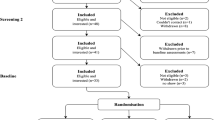Abstract
The impact of stress and depression on outcomes in patient with cardiovascular disease, including heart failure, is now well recognized and provides clear evidence for the importance of the mind-body connection. Ongoing research has identified physiologic pathways that govern these interactions that accordingly constitute targets for preventive therapies. A variety of non-pharmacologic practices and interventions that affect the mind-body axis have been preliminarily tested in patients with heart failure. Further development of these interventions may provide new cost-effective approaches to augment current guideline directed therapy and further enhance the prevention of adverse clinical events in patients with heart failure.
Similar content being viewed by others
References
Papers of particular interest, published recently, have been highlighted as: • Of importance
Emani S, Binkley PF. Mind-body medicine in chronic heart failure: a translational science challenge. Circ Heart Fail. 2010;3(6):715–25.
Olex S, Newberg A, Figueredo VM. Meditation: should a cardiologist care? Int J Cardiol. 2013;168(3):1805–10.
Kwekkeboom KL, Bratzke LC. A systematic review of relaxation, meditation, and guided imagery strategies for symptom management in heart failure. J Cardiovasc Nurs. 2015.
Yang GY, Wang LQ, Ren J, et al. Evidence base of clinical studies on tai chi: a bibliometric analysis. PLoS One. 2015;10(3):e0120655.
Hartley L, Flowers N, Lee MS, Ernst E, Rees K. Tai chi for primary prevention of cardiovascular disease. Cochrane Database Syst Rev. 2014;4:CD010366.
Yeh GY, Wood MJ, Lorell BH, et al. Effects of tai chi mind-body movement therapy on functional status and exercise capacity in patients with chronic heart failure: a randomized controlled trial. Am J Med. 2004;117(8):541–8.
Yeh GY, Wood MJ, Wayne PM, et al. Tai chi in patients with heart failure with preserved ejection fraction. Congest Heart Fail. 2013;19(2):77–84. A novel approach to the treatment of patients with hearrt failure and preserved ejection fraction.
Kubo A, Hung YY, Ritterman J. Yoga for heart failure patients: a feasibility pilot study with a multiethnic population. Int J Yoga Ther. 2011;21:77–83.
Toise SC, Sears SF, Schoenfeld MH, et al. Psychosocial and cardiac outcomes of yoga for ICD patients: a randomized clinical control trial. Pacing Clin Electrophysiol. 2014;37(1):48–62. An interesting article demonstrating decreased risk of ICD firing in patients practicing yoga.
Harada D, Asanoi H, Takagawa J, et al. Slow and deep respiration suppresses steady-state sympathetic nerve activity in patients with chronic heart failure: from modeling to clinical application. Am J Physiol Heart Circ Physiol. 2014;307(8):H1159–68.
Moravec CS. Biofeedback therapy in cardiovascular disease: rationale and research overview. Cleve Clin J Med. 2008;75 Suppl 2:S35–8.
Moravec CS, McKee MG. Phychophysiologic remodeling of the failing human heart. Biofeedback. 2013;41(1):7–12. A novel investigation of the impact of biofeedback on “reverse” ventricular remodelingin patients with heart failure.
Moser DK, Dracup K, Woo MA, Stevenson LW. Voluntary control of vascular tone by using skin-temperature biofeedback-relaxation in patients with advanced heart failure. Altern Ther Health Med. 1997;3(1):51–9.
Bernardi L, Porta C, Spicuzza L, et al. Slow breathing increases arterial baroreflex sensitivity in patients with chronic heart failure. Circulation. 2002;105(2):143–5.
Abtahi F, Berndtsson A, Abtahi S, Seoane F, Lindecrantz K. Development and preliminary evaluation of an android based heart rate variability biofeedback system. Conf Proc IEEE Eng Med Biol Soc. 2014;2014:3382–5.
Okada K, Kurita A, Takase B, et al. Effects of music therapy on autonomic nervous system activity, incidence of heart failure events, and plasma cytokine and catecholamine levels in elderly patients with cerebrovascular disease and dementia. Int Heart J. 2009;50(1):95–110.
Munro S, Mount B. Music therapy in palliative care. Can Med Assoc J. 1978;119(9):1029–34.
Lai HL. Music preference and relaxation in taiwanese elderly people. Geriatr Nurs. 2004;25(5):286–91.
Collste O, Tornvall P, Alam M, Frick M. Coronary flow reserve during dobutamine stress in takotsubo stress cardiomyopathy. BMJ Open. 2015;5(7):e007671. -2015-007671.
Santoro F, Ieva R, Musaico F, et al. Lack of efficacy of drug therapy in preventing takotsubo cardiomyopathy recurrence: a meta-analysis. Clin Cardiol. 2014;37(7):434–9. A critical appraisal of the benefit of beta blockade in the prevention of recurrent takotsubo cardiomyopathy events.
Sharkey SW, Windenburg DC, Lesser JR, et al. Natural history and expansive clinical profile of stress (tako-tsubo) cardiomyopathy. J Am Coll Cardiol. 2010;55(4):333–41.
Blumstein DT, Buckner J, Shah S, Patel S, Alfaro ME, Natterson-Horowitz B. The evolution of capture myopathy in hooved mammals: a model for human stress cardiomyopathy? Evol Med Public Health. 2015;2015(1):195–203. A novel comparative medicine approach to understanding the pathophysiology of takotsubo cardiomyopathy and possible mind-body interventions for its prevention.
Pace TW, Mletzko TC, Alagbe O, et al. Increased stress-induced inflammatory responses in male patients with major depression and increased early life stress. Am J Psychiatry. 2006;163(9):1630–3.
Kemper KJ, Carmin C, Mehta B, Binkley P. Integrative medical care plus mindfulness training for patients with congestive heart failure: proof of concept. J Evid Based Complement Altern Med. 2015. An integrative health approach to prevention of heart failure events that incorporates mind-body interventions.
Author information
Authors and Affiliations
Corresponding author
Ethics declarations
Conflict of Interest
Philip Binkley is on the editorial board of American Heart Journal.
Human and Animal Rights and Informed Consent
This article does not contain any studies with human or animal subjects performed by the author.
Additional information
This article is part of the Topical Collection on Heart Failure Prevention
Rights and permissions
About this article
Cite this article
Binkley, P.F. Mind-Body Approaches in Heart Failure Prevention. Curr Cardiovasc Risk Rep 10, 2 (2016). https://doi.org/10.1007/s12170-016-0482-9
Published:
DOI: https://doi.org/10.1007/s12170-016-0482-9




